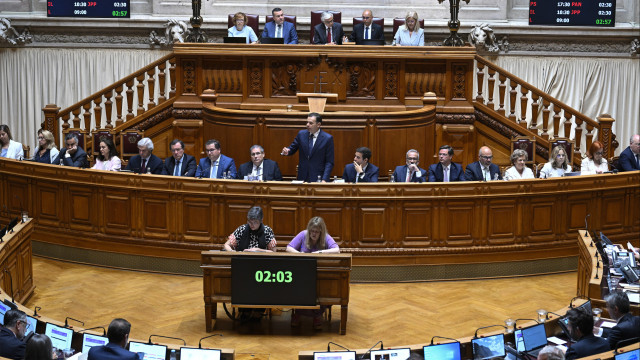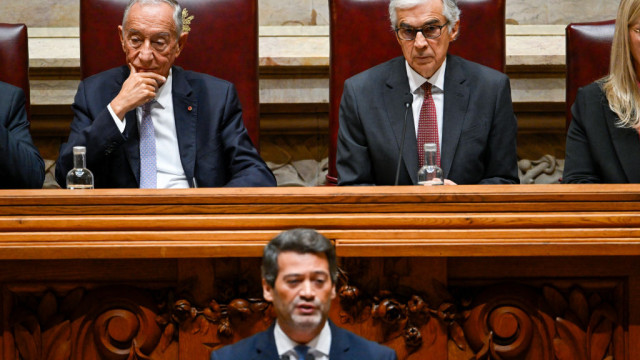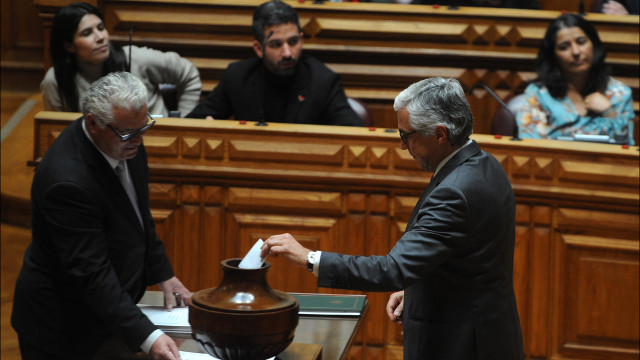Two days after the Government announced changes to the Nationality Law, issues surrounding the “lack of control in granting nationality and the need to limit family reunification” in Portugal were discussed in the Assembly of the Republic, at the request of Chega. This was the first urgent debate of the new legislature and was marked by the moment when the Government, through the voice of the Minister of the Presidency, Leitão Amaro, challenged André Ventura’s party to support the changes suggested by the Government to ensure “real immigration regulation” in the country.
“I hope that finally Chega contributes with its vote so that there is real immigration regulation in Portugal”, stated António Leitão Amaro during the debate, indicating that the Government submitted three bills to the Assembly of the Republic on Wednesday, to be discussed “next week”.
For the Minister, “the time has come for Chega to finally contribute with its vote to ensure that there is at least one rule, a solution that better controls immigration in Portugal“.
Therefore, Leitão Amaro inquired if the party led by André Ventura will support the proposal to create the Foreigners and Borders Unit within the PSP, also noting that in the last legislative elections, the Portuguese chose a Government that “regulates but does so without a radical discourse”.
Chega Accuses Government of “Selling Its Soul to PS”
Responding to the Minister’s challenge, the leader of Chega emphasized that the party “has wanted to control immigration from day one”, while the PSD, “fearful of losing political center, sold its soul to PS”, and considered that both the recent PS and PSD governments were “weak in immigration control”.
André Ventura further questioned whether the Government “will or will not prevent the continuation of family reunification in Portugal”, arguing that the “numbers are alarming” and must “be stopped, no matter the cost” – urging the Minister of the Presidency not to bring “empty talk” to the debate and “to tell the Portuguese, face to face, what and how he will do it”.
“Who will actually lose nationality after committing crimes in Portuguese territory? Will we end asylum subsidies for those who come here, are denied entry, and continue receiving social security support for months? Are we going to audit AIMA to ensure that all criminal authorizations granted for entering Portugal in recent years are duly investigated?”, he questioned.
“This is Chega’s challenge, this is the challenge of a nation that wants this problem, created by the Left, to be finally solved, but now it is up to the Right to resolve it. The time wasn’t yesterday, it’s today, the time to act is now”, said the leader of Chega.
Additionally, Ventura considered that the Government “arrived late to the debate”, but “better late than never”.
Immigration policy in Portugal has changed and truly changed a year ago, today it is regulated, but it is also regulation with a human touch
Following Ventura’s remarks, Minister António Leitão Amaro also held PS responsible for the current situation, labeling the socialist policy as “a disaster” and warned that it is an “wrong legacy that will be costly for decades”.
Subsequently, the government official noted that the “immigration policy in Portugal changed and truly changed a year ago, today it is regulated, but it also includes regulation with humanity”, listing the “10 major changes” implemented by the Government, noting that Chega failed to implement any change “for more regulated immigration”, nor did it include issues like family reunification or the extension of minimum timelines for obtaining nationality in its electoral program.
Livre, PCP and BE Accuse Right of Only Caring About “Poor” Immigrants
During the debate, Livre, PCP, and BE accused the Right of only caring about the families and nationality of poor immigrants, while keeping the doors open without rules for immigration from the wealthy, through ‘golden visas’.
“It’s strange that parties claiming to stand by families are the first to propose limiting family reunification”, stated Paulo Muacho from Livre, emphasizing that the proposal to revoke the nationality of naturalized individuals are measures “likely unconstitutional”, such as differing minimum residence periods for citizenship eligibility (seven years for citizens of Portuguese-speaking countries and ten for others), for “violating the principle of equality”.
The leader of PCP, Paula Santos, argued that “if there was any lack of control in granting Portuguese nationality”, it was due to the Sephardic law and ‘golden visas’.

Livre, PCP and BE accused today the right of only worrying about the families and nationality of poor immigrants while leaving the doors open without rules for wealthy immigration through ‘golden visas’.
Lusa | 17:14 – 25/06/2025
Regarding the law granting access to citizenship for Jews descended from Sephardim, the Communist leader argued that the decree became a “fraudulent scheme” for thousands of Israeli citizens, recalling the instances where “Portuguese nationality was sold by travel agencies in Tel Aviv”.
In the cases of ‘golden visas’ which grant a fast track to residency” which can culminate in citizenship, but “Chega doesn’t care about that” and aims to “limit family reunification only for the poor”, a stance the PCP views as a “regression in human rights”.
Likewise, Mariana Mortágua of BE accused the PSD and CDS of promoting public policies that differentiate poor immigrants from the rich: Those with money “can buy a ‘golden visa’ and come to Portugal”, but for the poorer cases, the Government “wants immigrants to immigrate to Portugal without the right to bring their family”.
On behalf of PS, socialist Pedro Delgado Alves accused Chega of mixing “all possible topics that could be associated with migration”, treating nationality requests as a problem, without ever providing numbers to support this concern.
On the Right, the leader of IL, Rui Rocha, focused his speech on the consequences of the Socialist governments’ migration policies, which led to an increase in the number of foreigners in Portugal from 400 thousand to 1.6 million: “The governments of António Costa are terrible governments”, with “harmful policies over several decades for the Portuguese”.
Speaking for the PSD, the social-democratic deputy Cristóvão Norte praised the changes to the nationality law, which seek to ensure that “those who want to be Portuguese do so for the right reasons”, with “affinity to the language” and “sense of belonging”.
In a request for clarification, the sole deputy of PAN accused the Government of “distinguishing between those who have money and those who don’t”, claiming it “is not humanism, it is a political choice”, constituting “a step backward”.
Aguiar-Branco Admits Chega’s Nationality Project with “Reservations”
Outside the debate, the Speaker of the Assembly of the Republic, José Pedro Aguiar-Branco, admitted Chega’s nationality project, although he admits having “reservations” about its constitutionality. Nevertheless, he understands that these can be corrected during the legislative process.
This position from Aguiar-Branco emerged from a public dispatch, a few days after the services of the Assembly of the Republic issued a non-binding opinion on Chega’s bill, which suggested it should not be admitted due to conflicts with the Constitution, particularly as it seeks to ensure the possibility of nationality loss in certain instances.
This non-binding opinion by parliamentary services even led Chega’s leader, André Ventura, last Friday, to accuse the Speaker of the Assembly of the Republic of “blocking” the party’s political action, even though Ventura made these statements before José Pedro Aguiar-Branco had made any decision on the matter.

André Ventura accused Aguiar-Branco of stepping back on the nationality law merely because Chega presented the project, thereby “blocking” the party. Meanwhile, the Speaker of Parliament clarified it was a “misunderstanding”. Stay updated on the controversy.
Cátia Carmo | 19:05 – 20/06/2025
Now, the Speaker of the Assembly of the Republic has revealed his decision to admit it “with proper reservations regarding the constitutional issues raised and subject to necessary corrections during the legislative process”.
The “reservations” primarily arise because the Assembly of the Republic’s Rules of Procedure, in its 120th article, states that bills and proposals or amendment proposals that “violate the Constitution or the principles enshrined therein are not admitted”.
It should be noted that in the project, Chega proposes the loss of nationality by naturalization to those who “are definitively sentenced to effective penalties exceeding three years of imprisonment” and to those “convicted by a final judgment passed or reviewed and confirmed by the Portuguese court, for the crime of terrorism”.

The Speaker of the Assembly of the Republic raises several constitutional doubts about Chega’s project to amend the nationality law, especially regarding the proposal for a convicted person to automatically lose nationality by naturalization.
Lusa | 16:50 – 25/06/2025




